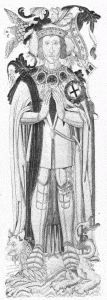 On this day in history, 12th March 1539, Thomas Boleyn, Earl of Wiltshire and Earl of Ormond, and father of Queen Anne Boleyn, died at Hever Castle, aged around 62. His servant, Robert Cranwell, wrote to Cromwell the next day to inform him of his death:-
On this day in history, 12th March 1539, Thomas Boleyn, Earl of Wiltshire and Earl of Ormond, and father of Queen Anne Boleyn, died at Hever Castle, aged around 62. His servant, Robert Cranwell, wrote to Cromwell the next day to inform him of his death:-
“My good lord and master is dead. He made the end of a good Christian man. Hever, 13 March.”1
Henry VIII ordered masses to be said for his soul, a clear sign that Thomas was back in favour at his death, and Thomas was laid to rest in the family church, St Peter’s Church at Hever. You can still see his tomb there today. It is decorated by a magnificent brass which shows him dressed as a Knight of the Garter and above his right shoulder sits his daughter Anne’s falcon crest and at his feet there is a griffin. His son, Henry Boleyn, is buried nearby, his tomb marked with a small cross on the stone floor.
You can find out more about Thomas Boleyn in my article “Thomas Boleyn, Father of Anne Boleyn”.
Notes and Sources
- LP xiv. 511
- LP xiv. 950